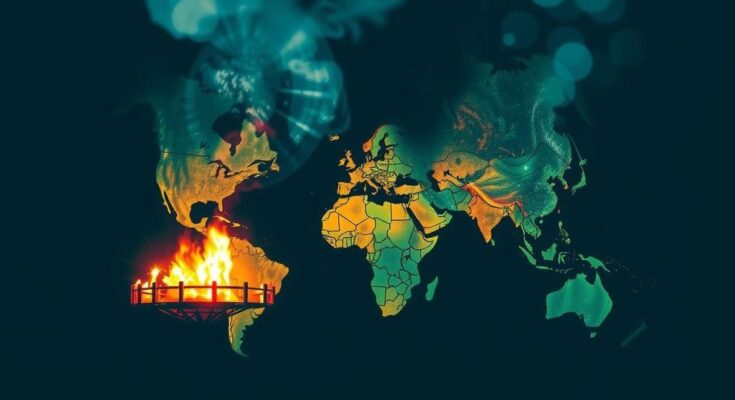This article reviews ten pivotal events in the climate change fight leading up to the UN climate summit in Azerbaijan. It outlines the formation of the IPCC, significant agreements like the Kyoto Protocol and the Paris Agreement, the influence of youth activism spearheaded by Greta Thunberg, and recent developments such as the 2022 biodiversity deal and the COP28 agreement to phase out fossil fuels, culminating in alarming climate forecasts for 2024.
As the UN Climate Summit approaches in Azerbaijan, it becomes crucial to revisit significant milestones in the ongoing struggle against climate change. The story begins in 1988 when the United Nations formed the Intergovernmental Panel on Climate Change (IPCC) after scientists alerted the organization to rising temperatures resulting from human activities. Following this, a major gathering known as the Earth Summit took place in 1992 in Rio de Janeiro, Brazil, leading to the establishment of the UN Framework Convention on Climate Change (UNFCCC), aimed at reducing greenhouse gas emissions. In 1997, the Kyoto Protocol was created, obligating industrialized nations to cut emissions by an average of 5.2 percent from 1990 levels; however, major emerging economies like China and India were not mandated to adhere to binding targets. The United States, then the leading emitter of carbon, declined to ratify the protocol, which came into force in 2005. The momentum built over the years brought the IPCC to another pivotal moment in 2007, when it reported that the evidence for global warming was undeniable, leading to the panel receiving the Nobel Peace Prize alongside former Vice President Al Gore for their advocacy efforts. However, the climate talks at COP15 in Copenhagen in 2009 fell short of producing any binding agreements for the period post-2012 despite some nations pledging to restrict temperature increases to 2 degrees Celsius. The landmark Paris Agreement was adopted in December 2015, where nearly every country committed to limiting global warming to well below 2 degrees Celsius, with the more ambitious target being 1.5 degrees Celsius. Subsequently, in 2018, Swedish activist Greta Thunberg ignited a global movement, inspiring students across the world to protest for more vigorous climate action. The urgency of these discussions continued, culminating in the 2022 biodiversity pact in Montreal, calling for significant protections for 30 percent of Earth’s land and oceans by 2030. As of 2023, the COP28 in Dubai marked a significant shift towards phasing out fossil fuels, with EU climate chief Wopke Hoekstra highlighting the deal as a long-overdue step in this battle. Now, as we look toward 2024, forecasts indicate this summer could become the hottest on record, surpassing critical temperature thresholds, thereby raising alarm for the future of our planet.
This article chronicles significant events in the international climate change movement, underscoring humanity’s efforts to address and mitigate the impacts of global warming over the past several decades. The timeline reflects the escalating acknowledgment of climate change, the establishment of key international agreements, the role of prominent activists, and the current state of global negotiations aimed at achieving a sustainable and livable world.
In conclusion, the fight against climate change has witnessed critical moments that have shaped our collective response to global warming. From the establishment of the IPCC in 1988 to recent pivotal agreements and movements, these events highlight the urgency and necessity of international cooperation in combating climate change. The implications of these milestones remind us of the continual struggle to balance economic growth with environmental sustainability, as the consequences of inaction become increasingly apparent.
Original Source: www.fox28spokane.com




